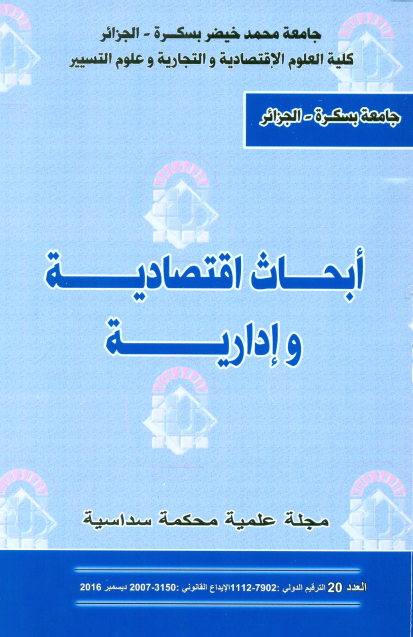التفكير الإستراتيجي وعلاقته بالتوجهات الزمنية لدى إطارات مؤسسة ENICAB
Résumé
في ظل التغيرات السريعة في ميدان الإقتصاد وإدارة المؤسسات، أصبح من الضروري بناء وتواجد رؤية للمستقبل، كما زادت الحاجة لتبني التفكير الإستراتيجي كمنهج جديد لبناء إستراتيجيات فعالة. لهذا نسعى من خلال هذه الدراسة إلى فهم مصطلح التفكير الإستراتيجي والمفاهيم المرتبطة به، ونحاول إيجاد العلاقة بين تفكير قادة المؤسسات والزمن كعامل نفسي و إجتماعي يعكس جزء من شخصيتهم. والزمن هنا نحصره في التوجهات الزمنية التي يبني الفرد من خلالها سلوكاته، أفكاره، أفعاله وحتى طموحاته أي مدى إرتباطه بماضيه وحاضره ومستقبله والعلاقات الذهنية التي يضعها الفرد بين هذه الأزمنة الثلاثة. فالدراسات الحديثة المتعلقة بالسلوك التنظيمي وشخصية القادة تجمع على أن التوجه الزمني للقائد يؤثر على تصوراته و إدراكه وبالتالي حتميا على قراراته وأفعاله.
الكلمات المفتاح: التفكير الإستراتيجي، الأنماط الزمنية، التوجهات الزمنية.
Abstract:
In light of the rapid changes in the field of economics and management of organizations, it became necessary to build a vision for the future, as the greater the need to adopt a new strategic thinking as a way to build effective strategies. For this, we seek through this study to understand the term of strategic thinking and concepts associated with it, and try to find the relationship between leaders thinking and the time as a sociological and psychological factor reflects part of their personality. The modern Studies relating to organizational behavior and personality of the leaders gathered that the time orientation of leader has an influence for him perceptions and him methodology of thinking. The leader with time orientation to the future is a person who encourages the risk and has a vision and strategic thinking very competitive, while the leader who has a time orientation to the past has a vision and strategic thinking governed which doesn’t encourage the change.
Key word: Strategic thinking, time styles, time orientationsRéférences
1). سعيد لوصيف، الأسس الزمنية للثقافة التنظيمية و سياق الإتصال في إدارة المنظمات، المجلة الجزائرية للإتصال، العدد 18، كلية العلوم السياسية والإعلام، جامعة الجزائر، جانفي-جوان، 2004.
2). سعيد لوصيف، علاقة أنماط الزمن بالقيادة التحويلية: حالة الإطارات القيادية الوسطى – محاولة تحليل نفسي إجتماعي- ، أطروحة مقدمة لنيل شهادة دكتوراه دولة في علم النفس التنظيمي، جامعة الجزائر، 2006/2007.
3). سعيد لوصيف، سليمان مظهر، دراسة الأنماط الزمنية لدى عينة من القيادات الإدارية الوسطى في قطاع البنوك الجزائرية، مجلة العلوم الإجتماعية ، المجلد 36، العدد 4، جامعة الكويت، 2008.
4). BERGADAA.M,"Le temps et le comportement de l'individu",2ème Partie, Recherche et application en marketing, Vol (4), n°1,1989.
5).HOFSTDE,G."Vivre dans un monde multiculturel", Editions d'Organisation, Paris, 1994.
6).JEAN-MARC FERRANDI ; PIERRE VALETTE-FLORENCE and OTHERS :"Linking Personal values and time orientations: The case of the attitude towards cellular phone in France and Germany", Conférence de vennis sur "la tendance de marketing en Europe", vennis, 2000.
7).Pascal Auregan, "Perception du temps et réflexion stratégique : Le cas des dirigeants d'entreprise moyenne", Finance Contrôle Stratégie, Vol(1), N°1, Mars 1998.
8). VALETTE-FLORENCE P, USUNIER J.C, FALCY S, « Comparaison des systèmes de valeurs et styles de temps : une étude exploratoire », Economies et Sociétés, Série Sciences de Gestion, n° 21 (5), 1995, pp. 87-115.
9).ZIADMALAS, DENISGUIOT;"La perspective future: Essai de clarification des construits et utilisations possibles on comportement du consommateur",6ème journées Normandes de recherche sur la consommation: société et consommation, ROUEN, 19-20 Mars2007


